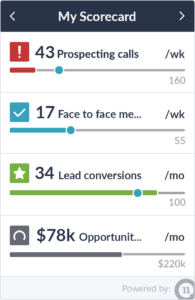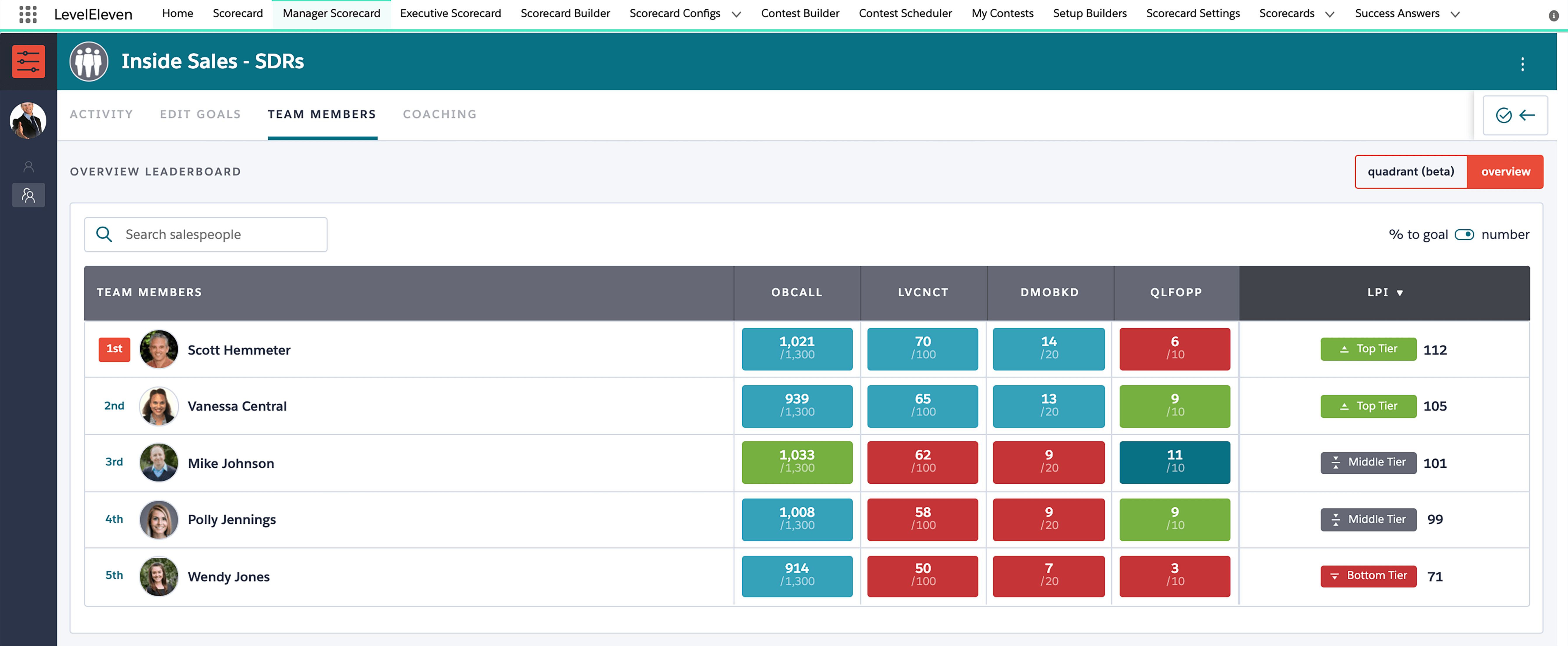Real-time Visibility Into Team Activity Without Micromanaging
Managers across all industries are seeking guidance on virtually keeping employees motivated and holding their teams accountable. The sales landscape has changed dramatically, and leaders are just as uncertain as their employees about how to overcome today’s challenges. We’re all just trying to do our best.
Particularly for sales managers, it’s more difficult than ever to have a clear view into the daily activities of your employees. Remote work means less opportunity to drop by and check-in with one of your reps, overhear conversations at lunch about the latest calls with prospects, or have your colleagues ask a quick question about their current opportunity’s progression.
On the other hand, as a sales rep, it can sometimes be a struggle to know what’s expected of you or whether you’re on track to meet your goals. Just because the sales landscape has changed, it doesn’t mean you don’t have quotas to fulfill and objectives to reach – in fact, you might be facing higher expectations and goals than before because of the slow-down experienced by many businesses in Q2 & Q3.
You need a solution that brings clarity, context and visibility to your sales performance for all parties involved, but without micromanaging – oh, and don’t forget, it has to be virtual. If you’re worried about getting off-pace or failing to meet your goals, this is where performance scorecards come in.
What Is a Performance Scorecard?
If you’re unfamiliar, a performance scorecard (or performance management scorecard) is a visual representation of a business or individual’s progress, over time, toward a certain goal or metric. Often, performance scorecards are used to track KPIs for sales development reps or sales teams.
Unlike dashboards, a sales performance scorecard shows progress toward a goal over time, rather than a status at one specific point in time. The progress, or history, is where you find the valuable insights in a sales performance scorecard.
It’s important to focus on more than just the bottom line. You need to understand the context, or the story of how you got there. Ideally, with a performance scorecard, sales reps should be able to instantly see how they’re performing against key metrics and goals, enabling them to focus efforts on key behaviors that drive performance. On the other hand, managers should be able to compare team members, quickly determining who is on track and identifying performance concerns to increase the likelihood of meeting goals.
So often, reports and dashboards miss out on context because they simply present you with the numbers. Imagine a scenario where your sales rep, Josh, sold $50,000 in the first half of the year. Maybe that number looks great on paper for just one salesperson. However, Josh had $10 million worth of opportunities that were “Closed-Lost” and his goal for that period was $500k – not so great when you put the numbers into context.
It’s one thing to look at the hard numbers in a lengthy report with an overload of information you don’t need – it’s quite another to be able to instantly see an overview that tells you exactly where you and your team stand.
How Does a Performance Scorecard Work?
LevelEleven’s Performance Scorecard solution provides an instant view of an individual or team’s progress against defined primary active metrics, or goals. With this tool, sales reps and managers can always keep their activity metrics top-of-mind and in focus.
Leveraging color-coding to help users digest and understand large amounts of data, Performance Scorecard shows progress toward 4 primary metrics that are customized to fit each customer’s business. Teams also have the ability to add up to 16 secondary metrics to their scorecard for a total of 20. In our example, the primary active metrics are Live Connects, Check-Ins, Pipeline, and Closed-Won Opportunities.
The color coding allows for instant understanding of a user’s pace: if you are behind pace to meet your monthly goal, the metric’s color displays in red. Blue is on pace, green is ahead, and the color of the metric displayed changes to teal when you hit your goal.
One aspect of the Performance and Manager Scorecard that powers such insights is the LevelEleven Performance Index (LPI), which offers a quick assessment of a sales rep’s overall effectiveness at meeting the metrics and goals that have the largest impact on their performance. The LPI score calculates how an individual is performing against the assigned “primary active metrics” on a 30 day rolling cycle, returning a score out of 250. This is used on the Performance Scorecard’s leaderboard to rank co-workers against one another in terms of consistent performance.
Not only do Performance Scorecards show you your current status in real-time, they give insight into the history of primary (and secondary) metrics that are customizable to each customer. This is where the valuable insights are found.
With one glance, you’re able to answer questions like:
- What did my team do last month?
- How did they pace throughout the month in relation to their goals?
- Are they getting better and improving over time?
How can a Performance Scorecard help you…
If you’re an individual sales rep?

How do you know if you’re staying on top of your goals and what you’re supposed to do? Do you know where you’re at with the goals that have been set for you by your manager?
These pain points are easily addressed with LevelEleven’s Performance Scorecard solution, which keeps you from feeling micromanaged while ensuring you know exactly what you need to do to achieve success as a sales rep. You’ll have an at-a-glance view of how you’re performing in relation to the goals that have been set for you.
Used by reps to measure their own success, Performance Scorecard gives you the ability to measure your actions against your goals. Individual scorecards enable you as a team member to compare your activities against teammates, driving competition and better performance.
In no time at all, you’ll realize that LevelEleven engages and encourages you to be proactive, enter information into Salesforce, and stay ahead of your colleagues in the rankings. This higher activity improves results overall for you and your team.
If you’re a sales manager?
How can you gain visibility into sales reps’ activities without micromanaging them? Are you sure you’re reinforcing the behaviors that lead to results? Will you be able to find out immediately if team members are falling off pace?
These are all valid (and common) questions many of you in leadership roles are asking right now. Luckily, even if you can’t see your reps making calls every day, there is a way to keep track of productivity and maintain accountability while working remotely. With a Manager Scorecard like LevelEleven’s that is native to – and pulls data directly from – Salesforce, you’ll have visibility into sales activities such as calls, demos booked, emails, or whatever other behaviors and KPIs you want to track.
As a sales manager, you can view team member performance and how your teams are pacing towards target goals in real-time. With insight into the relationships between top-, medium- and low-performing team members, you’ll be able to understand if reps are focusing on the right activities to achieve their goals, course-correct in a timely manner, and coach your team when performance is less than expected.

LevelEleven makes it easy to fix areas of concern in your team’s sales performance before they become serious problems that it’s too late to fix. You’ll be able to keep track of activities without having to pull a standard Salesforce report (aka data with no insights) and further discern which behaviors are driving the most business.
Focus on What You Can Control (Behavior) to Drive Results
In uncertain times, you have to focus on what you can control to drive the results and goals you want to achieve. Things like daily sales tasks, for example, can be controlled: how many calls were completed today? How many emails were sent? How many live connects were made?
Activities can be a big factor in sales success and holding reps accountable, and they are firmly within your control. Focus your energy here in order to emerge stronger and better positioned for the future.
However, you don’t want to simply pull a report with irrelevant metrics and no context. After all, data without insights is useless. Instead, work with a Performance Management System that includes real-time scorecards to enable accountability in a time when many are working apart and don’t have as much visibility or oversight into the day-to-day activities of employees.
Level Up Your Performance With LevelEleven
Back when we launched Performance Scorecard in 2014, it was the first CRM-based system to allow for this type of insight into sales reps’ effectiveness in certain tasks. In the years since that debut, we’ve worked with hundreds of customers, evolving the product into a more intuitive, customizable solution that unveils valuable insights into employee performance.
That is to say, we’ve been doing this for a long time and have the advantage of years of experience over our competitors. While there are others out there that have scorecard features, if you want a solution that goes beyond simply ‘meeting requirements,’ you need LevelEleven. Reach out for a demo and we’d love to show you the value that comes from working with a ‘Leader’ and ‘High Performer’ like LevelEleven.





